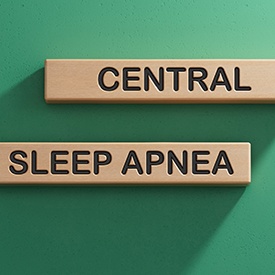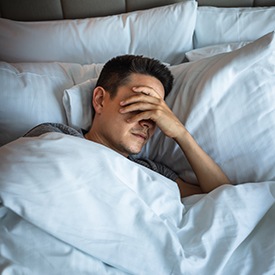Central Sleep Apnea Fort Worth
Learn the Basics of Central Sleep Apnea

When people talk about sleep apnea, they are usually referring to obstructive sleep apnea (OSA), which is a very common sleep disorder. However, central sleep apnea (CSA) is also a very real concern for a lot of patients in Fort Worth and throughout the world. What exactly is CSA, and what else should you know about it? This page explains some important basic facts.
What Is Central Sleep Apnea?

All types of sleep apnea are disorders characterized by repeated pauses in breathing during sleep. Whereas obstructive sleep apnea occurs due to tissues blocking the airway, central sleep apnea is different. It results from a failure of the brain to send proper breathing signals to the rest of the body. Due to this, CSA is often classified as a neurological condition.
CSA can occur on its own, but in some cases, it is present alongside OSA. (When a person has both types of sleep apnea, their condition may be called combined or mixed sleep apnea.)
Causes of Central Sleep Apnea

Some patients have idiopathic CSA, which means that no underlying cause has been diagnosed. However, other people may develop this condition due to a range of contributing factors, such as:
- Cheyne-Stokes Breathing: This condition affects around half of CSA patients and causes a person’s breathing to cyclically speed up, slow down, and then stop completely before starting again.
- Medications: Narcotics, like morphine, oxycontin, and Vicodin, are often associated with CSA.
- High Altitude: If you have ever visited high altitudes (above 8,000 feet), you might have noticed that the quality of your sleep changed. Many people are more likely to experience CSA symptoms in these areas.
- Medical Conditions: Serious medical problems, including heart failure, kidney failure, and Parkinson’s disease, have also been linked to CSA.
Possible Complications of Central Sleep Apnea

CSA can significantly affect the quality of your sleep and have big consequences for your overall health. As a result of this condition, you may be at a heightened risk of issues like:
- Heart attack
- Stroke
- Metabolic syndrome
- Daytime fatigue
- Sexual dysfunction
- Car accidents
- Mood disorders, such as depression and anxiety
When Should You See a Sleep Doctor?

If you have been feeling overly tired lately, or your partner has voiced concerns about how you breathe at night, it is certainly worth your time to visit a doctor. After they learn about your symptoms, they can determine if you should be tested for sleep apnea.
A sleep test is a non-invasive procedure that can look for indications of both CSA and OSA. After your condition has been diagnosed, you can learn about your treatment options. For example, you might benefit from a CPAP machine or a similar device. If you have OSA or combined sleep apnea, a custom oral appliance from a dentist may also be helpful.
Our Fort Worth practice specializes in oral appliance therapy, and we can help with combined therapy as well. Get in touch with us today to learn more.
